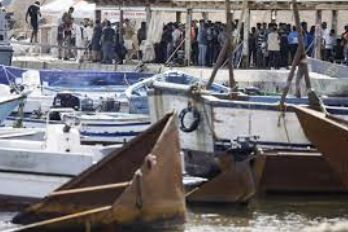Italy Approves New Measures to Address Migration Crisis as Overwhelmed Lampedusa Calls for Naval Blockade
Italian government approves new measures to address the migration issue, including extending detention time and increasing detention centers. Calls for naval blockade of North Africa supported by Italian Premier and EU Commission President. Division within the EU as some countries object to the plan.
The Italian government has approved new measures to address the ongoing migration issue, particularly concerning migrants who do not qualify for asylum and are scheduled to be repatriated to their home countries. In response to the recent overwhelming influx of migrants from Tunisia, the government plans to extend the maximum detention time to 18 months and increase the number of detention centers to accommodate them. The island of Lampedusa, which is closer to Tunisia than the Italian mainland, experienced a record-breaking arrival of nearly 7,000 migrants in a single day, putting immense pressure on the already strained resources of the island. These events have reignited discussions about implementing a naval blockade to deter human traffickers from launching smuggling boats into the Mediterranean.
Italian Premier Giorgia Meloni, who visited Lampedusa alongside Commission President Ursula von der Leyen, has echoed calls for a naval blockade of North Africa to prevent illegal departures. In June, the European Commission signed an agreement with the Tunisian government, pledging economic aid in exchange for assistance in preventing departures. However, a similar agreement with Libya in the past has been criticized by human rights groups as a violation of international maritime law, given the lack of safety in Libyan ports and the inhumane treatment of migrants intercepted by the Libyan coast guard.
Meloni has been supported in her hardline stance by von der Leyen, who emphasized that the European Union should have primary control over who enters its borders. To address the migration issue further, von der Leyen presented a 10-point plan that included establishing operational partnerships on anti-smuggling with countries of origin and transit. Possible collaborations between Tunisia and Frontex, the EU border force, and a coordinating task force within Europol are being considered. The Commission has expressed its support for exploring the possibility of a naval blockade. However, the recent influx of migrants has caused division within the EU and its member states, as well as in Meloni's far-right-led government.
Some countries have objected to the way von der Leyen pushed the Tunisia plan through, claiming that they were not properly consulted. In Italy, Vice Premier Matteo Salvini, the head of the populist, right-wing League, has challenged the efficacy of Meloni's EU-Tunisia agreement. He recently hosted French right-wing leader Marine Le Pen at a League rally, where they both criticized the French government's response to the migration issue.
The French government, under President Emmanuel Macron, has also taken a stricter stance on migration and security, with interior minister Gerald Darmanin expressing solidarity with Italy but emphasizing the need to differentiate between those who should be welcomed and those who have no legitimate reason to be in Europe. The current situation in Lampedusa has put pressure on Italy and its neighboring countries to find a balanced approach to addressing the migration issue. As European Parliament elections loom, the migration debate is likely to continue to shape political agendas and policies within and beyond Italy. The intensity of the issue underscores the need for collaborative efforts and comprehensive solutions that protect both the rights of migrants and the security of Europe's borders.




